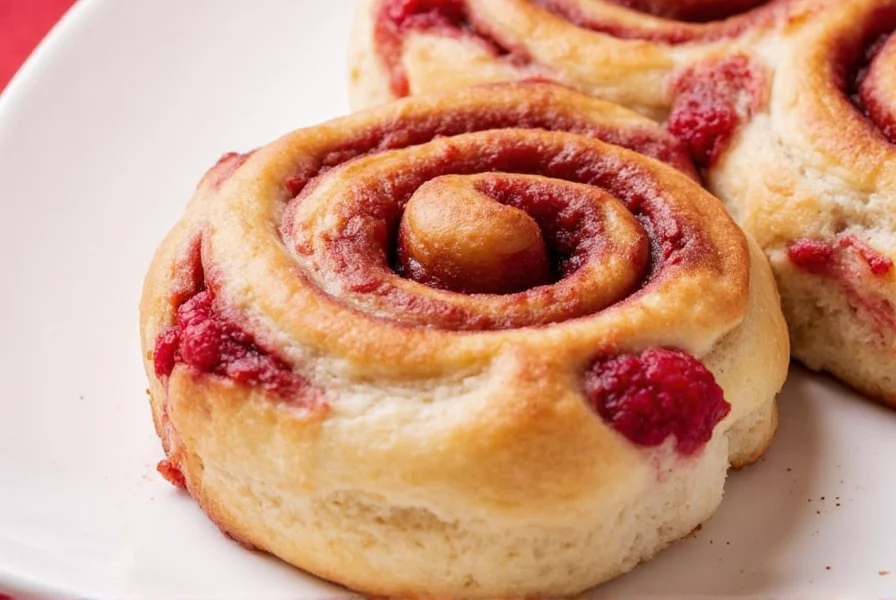Nothing compares to the aroma of freshly baked raspberry cinnamon rolls filling your kitchen. These sweet treats elevate the traditional cinnamon roll with the vibrant flavor of raspberries, creating a perfect balance of tart and sweet. Whether you're baking for a special breakfast, brunch gathering, or simply treating yourself, mastering this recipe will become a cherished skill in your baking repertoire.
Why Raspberry Cinnamon Rolls Stand Out
Raspberry cinnamon rolls offer a delightful twist on the classic pastry. The natural tartness of raspberries cuts through the richness of the dough and frosting, creating a more complex flavor profile that many find preferable to traditional cinnamon rolls. When made properly, the raspberry element enhances rather than overwhelms the familiar cinnamon-spice notes that make this pastry so beloved.
Essential Ingredients for Perfect Raspberry Cinnamon Rolls
The quality of your ingredients directly impacts the final result. Don't compromise on these key components:
| Ingredient | Why It Matters | Recommended Type |
|---|---|---|
| All-purpose flour | Provides structure without making rolls tough | Unbleached, measure by weight for accuracy |
| Unsalted butter | Creates flaky layers and rich flavor | European-style (82% fat content) for best results |
| Raspberry preserves | Determines the quality of raspberry flavor | Seedless, no artificial flavors or colors |
| Active dry yeast | Proper rise without sourdough tang | Fresh packet, check expiration date |

Step-by-Step Baking Process
Dough Preparation
Begin by activating your yeast in warm milk (105-110°F) with a pinch of sugar. After 5-10 minutes, it should become frothy. In a separate bowl, combine 3½ cups of flour, sugar, salt, and softened butter. Mix until crumbly, then add the yeast mixture and one egg. Knead for 5-7 minutes until smooth and elastic. The dough should be slightly tacky but not stick to clean hands.
First Rise
Place the dough in a lightly greased bowl, cover with plastic wrap, and let rise in a warm spot until doubled (about 1-1.5 hours). The ideal temperature for rising is 75-80°F. Don't rush this step—proper fermentation develops flavor.
Rolling and Filling
Roll the risen dough into a 16x12 inch rectangle on a floured surface. Spread softened butter evenly over the surface, then sprinkle with cinnamon-sugar mixture (¾ cup sugar + 2 tbsp cinnamon). Carefully dot with ½ cup of high-quality raspberry preserves, leaving a ½ inch border. Roll tightly from the long side, pinching the seam to seal.
Second Rise and Baking
Cut the rolled dough into 12 equal pieces using dental floss or a serrated knife. Place in a greased 9x13 inch pan, cover, and let rise until puffy (30-45 minutes). Bake at 350°F for 22-25 minutes until golden brown. The internal temperature should reach 190°F.

Perfecting Your Raspberry Filling
The raspberry element makes or breaks this recipe. For the best raspberry cinnamon rolls recipe, consider these filling options:
- Seedless preserves: Most reliable option that won't make the rolls soggy
- Fresh raspberry reduction: Simmer 2 cups fresh raspberries with 2 tbsp sugar until thickened
- Raspberry jam swirl: Mix preserves with a tablespoon of cornstarch to prevent excess moisture
Avoid using fresh berries directly in the filling as they release too much liquid during baking, which can make your rolls soggy. If you prefer a more intense raspberry flavor, add ½ teaspoon of raspberry extract to your cream cheese frosting.
Troubleshooting Common Issues
Even experienced bakers encounter challenges with raspberry cinnamon rolls from scratch. Here's how to solve frequent problems:
- Soggy bottoms: Result from too much moisture in the raspberry filling. Solution: Use seedless preserves and consider adding 1 tsp cornstarch to the filling
- Tight rolls: Dough wasn't rolled out large enough or rolled too tightly. Aim for a 16x12 inch rectangle and roll gently but firmly
- Flat rolls: Over-rising or too much sugar in the dough. Don't let rolls rise more than doubled before baking
- Burnt edges: Oven temperature too high. Use an oven thermometer to verify accuracy
Serving and Storage Tips
For optimal flavor and texture, serve raspberry cinnamon rolls warm but not hot—allow them to cool for 15-20 minutes after baking. The frosting should be thick but spreadable, not runny. Store leftovers in an airtight container at room temperature for up to 2 days or freeze for longer storage. To refresh, microwave individual rolls for 15-20 seconds or warm in a 300°F oven for 5 minutes.
Popular Variations to Try
Once you've mastered the easy raspberry cinnamon roll recipe, experiment with these delicious variations:
- White chocolate raspberry: Add white chocolate chips to the filling
- Lemon-raspberry: Incorporate lemon zest into the dough and frosting
- Almond raspberry: Add ½ tsp almond extract to the dough
- Gluten-free version: Use a quality gluten-free flour blend and add 1 tsp xanthan gum
Frequently Asked Questions
Can I use frozen raspberries for the filling?
While possible, frozen raspberries release too much liquid when thawed, which can make your rolls soggy. For the best results with raspberry cinnamon rolls, use seedless raspberry preserves or make a reduced raspberry sauce by simmering fresh or frozen berries with sugar and cornstarch until thickened.
How do I prevent raspberry filling from leaking during baking?
To prevent raspberry filling leakage in cinnamon rolls, use seedless preserves rather than fresh berries, leave a ½ inch border when spreading, and ensure your dough roll is tightly sealed along the edge. Adding 1 teaspoon of cornstarch to the raspberry filling helps absorb excess moisture during baking.
Can I prepare raspberry cinnamon rolls the night before?
Yes, you can prepare raspberry cinnamon rolls ahead of time. After cutting the rolls and placing them in the pan, cover tightly and refrigerate overnight. In the morning, remove from the refrigerator 30 minutes before baking to allow for final rise, then bake as directed. This make-ahead method produces excellent results for weekend brunches.
What's the secret to a soft, fluffy texture in raspberry cinnamon rolls?
The secret to soft, fluffy raspberry cinnamon rolls lies in proper dough hydration, not over-kneading, and careful rising. Use the exact liquid measurements, knead just until smooth and elastic (5-7 minutes), and allow proper rising time until doubled. Over-flouring the work surface when rolling can also lead to dry, dense rolls.
How can I make my raspberry cinnamon rolls more visually appealing?
For visually stunning raspberry cinnamon rolls, create a marbled effect by swirling raspberry preserves through the cinnamon-sugar mixture rather than spreading it evenly. You can also sprinkle additional fresh raspberries on top before baking, or add a raspberry drizzle to the finished cream cheese frosting for an elegant presentation.











 浙公网安备
33010002000092号
浙公网安备
33010002000092号 浙B2-20120091-4
浙B2-20120091-4